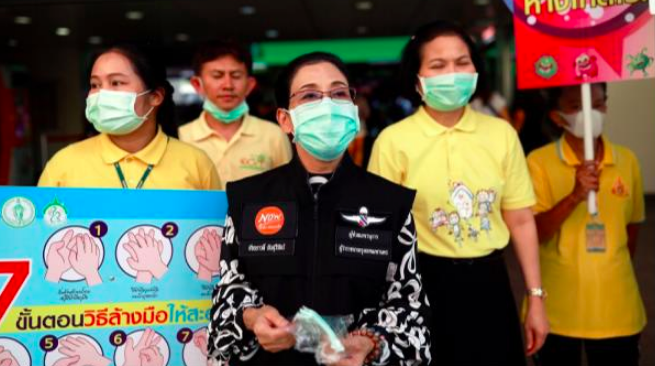Innovating Local Government Service Delivery within a COVID 19 Response Policy
 Officials in Bangkok give out masks free of charge (Soe Zeya Tun / Reuters)
Officials in Bangkok give out masks free of charge (Soe Zeya Tun / Reuters)
Today, much emphasis is being placed on the national policy response mechanisms to mitigate the immediate “human impacts” of COVID-19.
Such policies include regional agreements, large national stimulus packages, calls for supply chain assistance, repurposed ODA, and the emergence of global calls for harmonized solutions. However, such national policy agendas need localized implementation, which often requires localization through the establishment of new by-laws and local government policies and directives. This blog looks at the innovative local government responses to COVID 19 in South East Asia and the potential role of sub national governments post crisis.
Leaders of the ASEAN Member States +3 neighboring countries (ASEAN +3) S met virtually for a Special ASEAN summit (14 April 2020) chaired by the Prime Minister of Viet Nam. At a regional level ASEAN is promoting policy and practical solutions that aim to maintain the integrity of the bloc calling for trans-national arrangements to preserve supply chain connectivity. Such actions providing for the continuation of trade and the smooth flow of essential goods, including medical, food and other essential supplies, with the key takeaways being;
- Keeping markets open for trade and investment, with a view to ensuring food security, such as the utilization of the ASEAN Plus Three Emergency Rice Reserve (APTERR), and strengthening the resiliency and sustainability of regional supply chains, especially for food, commodities, medicines, medical and essential supplies.
- Implementing appropriate measures to boost confidence and improve stability of the regional economy, with special attention to micro, small and medium enterprises (MSMEs) and vulnerable groups.
- Cooperating in ensuring social safety net for our peoples and continue efforts to design and implement risk-informed and shock-responsive social protection systems.
- The development of a post-pandemic recovery plan to share lessons learned, restore ASEAN’s connectivity, tourism, normal business and social activities, prevent potential economic downturns.
The above policy points, that have been agreed by the leaders of the AMS +3, provides a new environment to enhance the role of sub-national governments within the region. Given the general application of social distancing within the region that includes city lockdowns and restrictions on in-country travel, local governments will lead on the enactment of policy via the development of new services such as food security, which is sourced at the point of production, i.e. within local government territories, assuring local economic stability that reaches last mile communities, delivering on social safety net obligations and undertaking lead roles in post-pandemic recovery.
As highlighted by UCLG ASPAC (https://uclg-aspac.org) many cities and sub national governments in ASEAN + 3 are taking up the challenge of a rapid COVID response policy development and implementation and sharing real-world practices. This is creating an immediate evidence base for other ASEAN cities to further develop similar policy and implementation plans with limited cost and within a short time period.
Innovating Local Government Policy and Practical Response
Iriga City, Philippines has developed a comprehensive policy response that includes the passing of local bylaws to; (i) establish organizational and support structures, (ii) maintenance and enhancement of COVID 19 response consultations and stakeholder meetings, (iii) community awareness raising (local government initiated information education campaign) providing timelines of key actions, (iv) community / stakeholder participation in the response, (v) implementation guidelines that includes two innovations – price monitoring at local markets and vegetables on wheels. Source: https://uclg-aspac.org/wp-content/uploads/2020/03/Iriga-OPERATION-AND-MANAGEMENT-ON-RESPONSE-AND-PREVENTION-OF-COVID.pdf
Jeonju City, Republic of South Korea have developed and implement an on-going rapid policy response. Key innovations include; (i) establishment of a COVID 19 response infrastructure, (ii) launched the “Kind Landlord Movement” to reduce rents for merchants, (iii) implemented the Jeonju Fumigation Day (repeating every Wednesday) whereby the city is fumigated through citizen volunteerism, (iv) established a local economic advisory group, (v) established the Basic Disaster Income payments to venerable groups and (vi) delivered masks to low income groups, chronic disease groups and pregnant women. Source: https://uclg-aspac.org/wpcontent/uploads/2020/03/JeonjusCOVID19ResponseInitiatives-3.pdf
As illustrated in the cited example, and there are ample references in ASEAN +3 of innovative local government policy responses to COVID-19. These policies will potentially remain post COVID 19 and can usher in new municipal services and encourage citizen delivered services that provide positive socio-economic impacts.
Of importance is that this new crop of innovative local services does not place excessive financial demands on local budgets but leverages citizens responsibility as a collective for their cities and takes advantage of the in-built local societal resilience. It is these two points that can create an advantage in the least developed countries to broaden and grow local economies in the post COVID environment.
UNCDF is partnering with UCLG ASPAC and engaging with local governments in the region to future proof and replicate some of these innovative services and sub policies to drive social economic recovery.
Guest blog entry contributed by Paul Martin, UNCDF Regional Advisor, paul.martin@uncdf.org